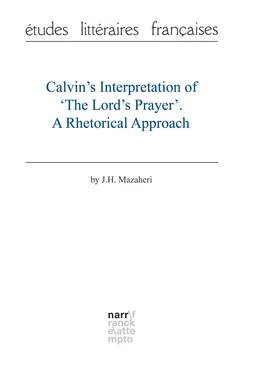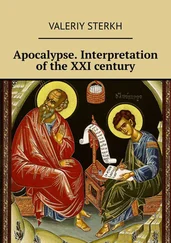Professor J.H. Mazaheri - Calvin's Interpretation of 'The Lord's Prayer'. A Rhetorical Approach
Здесь есть возможность читать онлайн «Professor J.H. Mazaheri - Calvin's Interpretation of 'The Lord's Prayer'. A Rhetorical Approach» — ознакомительный отрывок электронной книги совершенно бесплатно, а после прочтения отрывка купить полную версию. В некоторых случаях можно слушать аудио, скачать через торрент в формате fb2 и присутствует краткое содержание. Жанр: unrecognised, на английском языке. Описание произведения, (предисловие) а так же отзывы посетителей доступны на портале библиотеки ЛибКат.
- Название:Calvin's Interpretation of 'The Lord's Prayer'. A Rhetorical Approach
- Автор:
- Жанр:
- Год:неизвестен
- ISBN:нет данных
- Рейтинг книги:4 / 5. Голосов: 1
-
Избранное:Добавить в избранное
- Отзывы:
-
Ваша оценка:
- 80
- 1
- 2
- 3
- 4
- 5
Calvin's Interpretation of 'The Lord's Prayer'. A Rhetorical Approach: краткое содержание, описание и аннотация
Предлагаем к чтению аннотацию, описание, краткое содержание или предисловие (зависит от того, что написал сам автор книги «Calvin's Interpretation of 'The Lord's Prayer'. A Rhetorical Approach»). Если вы не нашли необходимую информацию о книге — напишите в комментариях, мы постараемся отыскать её.
Calvin's Interpretation of 'The Lord's Prayer'. A Rhetorical Approach — читать онлайн ознакомительный отрывок
Ниже представлен текст книги, разбитый по страницам. Система сохранения места последней прочитанной страницы, позволяет с удобством читать онлайн бесплатно книгу «Calvin's Interpretation of 'The Lord's Prayer'. A Rhetorical Approach», без необходимости каждый раз заново искать на чём Вы остановились. Поставьте закладку, и сможете в любой момент перейти на страницу, на которой закончили чтение.
Интервал:
Закладка:
Car nous ne pouvons subvenir de noz biens sinon à ceux desquels nous savons la povreté; mais nous pouvons et devons ayder par oraison ceux mesmes desquels n’avons point la cognoissance, et qui sont esloignez de nous par quelque distance et intervalle que ce soit. Ce qui se fait par la généralité des oraisons, en laquelle sont comprins tous les enfants de Dieu, au nombre desquels aussi ceux là sont. (Calvin 382)
The universality of Calvin’s thought is again shown here, since there is no geographical or cultural or religious border for him: any poor person, wherever he or she lives must be prayed for (“et qui sont esloignez de nous par quelque distance et intervalle que ce soit.”) The way Augustine presents the poor is also profound but different. He gives the example of a senator, who, like rich people in general, despises the poor. Then the theologian points out the fact that one’s social condition being fragile, someday this senator could become poor himself, and so he should be compassionate and understand the poor: “Since, indeed, he (the senator) despises that in the beggar to which even he himself may be reduced by the vicissitude of human affairs: but God never falls into baseness of character.” (Augustine 39).11 In this way, the rich and the poor are the same, both God’s children.
II. Who art in Heaven
According to Augustine, “Heaven” is both a metaphor and a metonymy:
1º) Heaven conceived as a space . It is a noun, a place , but a spiritual place, not a material one. The metaphor, “in Heaven,” means therefore, “in the holy place” (Augustine 39):For God is not contained in space. For the heavens are indeed the higher material bodies of the world, but yet material, and therefore cannot exist except in some definite place; but if God’s place is believed to be in the heavens, as meaning the higher parts of the world, the birds are of greater value than we, for their life is nearer to God. But it is not written, The Lord is nigh unto tall men, or unto those who dwell on mountains; but it is written, ‘The Lord is nigh unto them that are of a broken heart,’ which refers to humility. (Augustine 39)1The condition sine qua non of holiness is “humility,” and so God is close to humble people only. The holy place, or “Heaven,” is the latter’s heart.
2º) Heaven conceived as a qualifier or a person . As a qualifier, it means “righteous,” “just,” “holy,” or as a noun, a rightous or holy person. Thus after having compared “heaven” to a place, by referring to the Psalms , Augustine now bases his argument on Genesis 3:19 in which “heaven” refers to a person: “But as a sinner is called earth, when it is said to him, ‘Earth thou art, and unto earth shalt thou return;’ so, on the other hand, a righteous man may be called heaven” (Augustine 39). A holy person is at once “heaven” and “ in heaven.”
3º) The temple of God . Furthermore, a holy person, as Paul says, is God’s temple. The theologian quotes then I Corinthians 3: 17: “For the temple of God is holy, which temple ye are” (Augustine 39).2 Therefore, “the Father in Heaven” means the God who dwells in the holy people, that is, according to Psalm 34:18, the “broakenhearted” and the “crushed in spirit,” in other words the humble ones. Nevertheless, the radical distinction Augustine makes between the righteous and the sinners is somewhat confusing: does he mean by “the righteous” people who never sin? In this case, his conception would differ from that of the New Testament , in which even a Peter is not guiltless. But he may also mean by saints people who have been touched by the Grace of God in a special way and their faith is above the ordinary, even though they may temporarily go astray like everyone else.
To explain the term “heaven,” Calvin refers to 1 Kings 8: 27, Isaiah 66:1, Acts 7: 49, and Acts 17:24, in order to show that it is only a metaphor. Since it is an abstract notion, the Scripture uses a concrete image which corresponds to the highest thing visible, because our “ignorance” and “stupidity” prevents us from understanding the abstract:
Mais pourtant que nostre ignorance et imbécillité d’esprit ne peut autrement comprendre ne concevoir sa gloire, puissance, sublimité et hautesse, il nous la signifie par le ciel, qui est la chose la plus haute, et pleine de gloire et majesté que nous pouvons contempler. (Calvin 383)
Calvin’s explanation does not differ from that of Augustine insofar as “heaven” is in their view, which is based on the Scripture, only a metaphor, but their divergence must also be noted. Whereas the Church Father brings God down to earth and places “heaven” in the heart of a holy person, a “saint,” so as to make Him more accessible, Calvin wants the believer’s thought to elevate itself and imagine the highest spiritual thing possible, the sublimest, that is God in his “glory” and “majesty.” Thus we can notice an abstract movement in the imagination of both theologians with respect to the notion of “Heaven,” but one is descending from God to Man, the other ascending from Man to God. Calvin puts the emphasis on the Father’s infinite “majesty” and “power,” impossible to conceive, out of reach, and absolute. The expressions he stresses and to which “heaven” refers, are “hautesse infinie ,” “essence incompréhensible ,” “puissance inénarrable ,” and “immortalité éternelle .” Calvin’s interpretation stimulates the readers’ desire to elevate their spirit by suggesting at the same time their extreme weakness and misery. On the other hand, Augustine’s belief in “saint” and “righteous” people may seem more encouraging and positive, although not in accordance with the Gospels. Yet Calvin does not mean to discourage his reader, for he justifies in the following way his explanation of the term “heaven”: “A ceste cause ce mot nous doit esmouvoir à élever noz cœurs et noz esprits quand nous pensons à Dieu, pour ne rien imaginer de luy charnel ou terrien, et ne le vouloir reigler selon nostre raison mondaine, n’assuiettir à noz affections.” (Calvin 383) We should not feel down because of the infinite distance which separates us from the heavenly Father, but rather become more humble as we realize how helpless and miserable we are if we refuse to depend on Him. Moreover, the idea of the inaccessible Father necessarily brings about the figure of the Mediator. Calvin started his exegesis by emphasizing the fundamental role of Christ without whom the Father could not be known to us; he returns to Him again in order to show that this “heaven,” so far from us, can be approached only through the Son. He became man in order to show us the way to elevate our mind and get closer to the Father. It is important to note that this reference to Christ is absent in Augustine’s exegesis, or at least not evident, as if the relation between the Father and humans would be possible without the Mediator. Furthermore, Calvin does not separate the people into “saints” and “sinners,” for nobody in his view is perfect, and the closeness to God is relative. He just puts the emphasis on Christ without whom there is no approach possible to the Father and no understanding of “heaven” whatsoever:
La somme est, que sous le nom de Père, ce Dieu qui nous est apparu en l’image de son Fils, nous est mis en avant, afin que nous l’invoquions en certitude de foy, et que non seulement ce nom de Père, selon qu’il est familier, doit servir à confermer nostre fiance, mais aussi à retenir noz esprits, afin qu’ils ne soyent point distraits à aucuns dieux incognuz ou controuvez, mais plustost qu’estans conduits par le Fils unique, ils montent tout droit à celuy qui est seul Père des Anges et des hommes. Secondement, quand son throne luy est establi au ciel, que nous sommes advertis puisqu’il gouverne le monde, que nous ne venons pas à luy en vain, veu que de son bon gré il a soin de ses créatures. (Calvin 383)
Читать дальшеИнтервал:
Закладка:
Похожие книги на «Calvin's Interpretation of 'The Lord's Prayer'. A Rhetorical Approach»
Представляем Вашему вниманию похожие книги на «Calvin's Interpretation of 'The Lord's Prayer'. A Rhetorical Approach» списком для выбора. Мы отобрали схожую по названию и смыслу литературу в надежде предоставить читателям больше вариантов отыскать новые, интересные, ещё непрочитанные произведения.
Обсуждение, отзывы о книге «Calvin's Interpretation of 'The Lord's Prayer'. A Rhetorical Approach» и просто собственные мнения читателей. Оставьте ваши комментарии, напишите, что Вы думаете о произведении, его смысле или главных героях. Укажите что конкретно понравилось, а что нет, и почему Вы так считаете.












